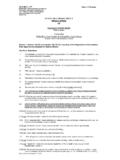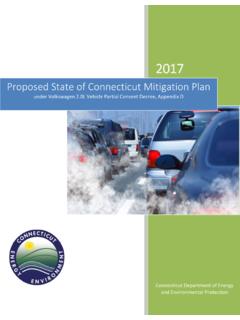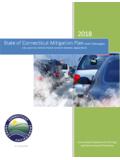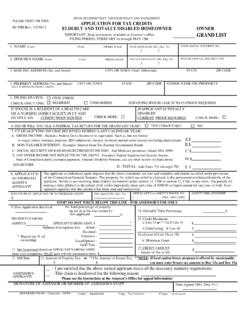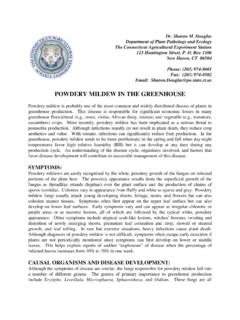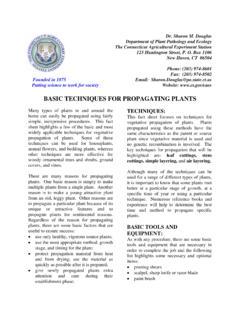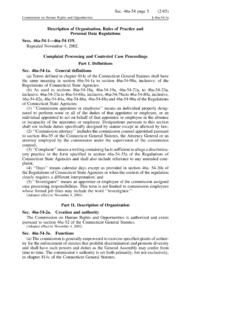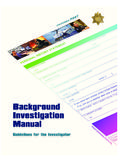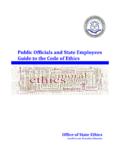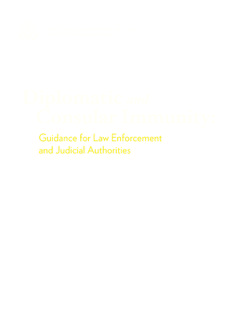Transcription of Public Officials and State Employees Guide to the …
1 Public Officials and State Employees Guide to the Code of Ethics Office of State Ethics Carol Carson, Executive Director Public Officials and State Employees Guide to the Code of Ethics (Rev. January 2014) PAGE| 2 TABLE OF CONTENTS Office of State Ethics 3 Introduction 3 Citizen s Ethics Advisory Board 3 Mission 4 Statutory Responsibility 4 Public Service 4 The Big Picture 4 Gifts 5 Restricted Donors 5 Non Restricted Donors 5 Gift Exceptions 6 Major Life Event 7 Gift Reporting Requirements 7 Gifts Between State Employees 8 Necessary Expenses 9 Fees and/or Honoraria 9 Conflicts of Interest 10 Substantial Conflict of Interest 10 Required Action for Substantial Conflict 10 Potential Conflict of Interest 1 0 Required Action for Potential Conflict 1 1 Ethics at Work 1 2 Post State
2 Employment (Revolving Door) 1 2 Lifetime Bans 1 2 One-Year Bans 1 2 Outside Employment 1 3 Statements of Financial Interests 1 4 Statutory Authority 1 4 Governor Malloy s Standard 1 4 Ethics Compliance 1 5 Ethics Compliance Officers and Ethics Liaisons 1 5 Mandatory Reporters 1 5 Ethics Enforcement 1 6 Procedures and Penalties 1 6 Public Officials and State Employees Guide to the Code of Ethics (Rev. January 2014) PAGE| 3 OFFICE OF State ETHICS Introduction The Office of State Ethics was created on July 1, 2005, pursuant to Public Act 05-183, and is an independent regulatory division of the Office of Governmental Accountability, charged with administering and enforcing the Connecticut Codes of Ethics, located in Chapter 10 of the Connecticut General Statutes.
3 The Office of State Ethics educates all those covered by the Ethics Codes; provides information to the Public ; interprets and applies the Connecticut Codes of Ethics; and investigates violations of, and otherwise enforces, the Ethics Codes. The Office of State Ethics consists of: Citizen s Ethics Advisory Board Executive Director Legal Division Enforcement Division The Office of State Ethics has the following jurisdiction: Part I The Code of Ethics for Public Officials 1-79 to 1-90a Part II The Code of Ethics for Lobbyists 1-91 to 1-101a Part III Lobbying: Miscellaneous Provisions 1-101aa and 1-101bb Part IV Ethical Considerations Concerning Bidding and State Contracts 1-101mm to 1-101rr Citizen s Ethics Advisory Board The governing body of the Office of State Ethics is the Citizen's Ethics Advisory Board, it is comprised of nine members.
4 The members are appointed by the Governor and legislative leaders for staggered, non-renewable, four-year terms. Board Members: Attend monthly Citizen s Ethics Advisory Board meetings Appoint and evaluate the Executive Director of the Office of State Ethics Serve as Hearing Officers for non-confidential UAPA hearings Attend hearings to determine whether violations occurred and assess penalties Oversee legislative agenda A schedule of Citizen s Ethics Advisory Board meeting dates, times and locations is available at Public Officials and State Employees Guide to the Code of Ethics (Rev. January 2014) PAGE| 4 MISSION The mission of the Office of State Ethics is to practice and promote the highest ethical standards and accountability in State government by providing education and legal advice, ensuring disclosure, and impartially enforcing the Codes of Ethics.
5 STATUTORY RESPONSIBILITY The statutory responsibilities of the Office of State Ethics are broken down into four main categories: education, interpretation, enforcement and disclosure. The Office of State Ethics is charged with providing education, guidance and advice to State Employees , Public Officials , lobbyists and legislators on the Codes of Ethics. All investigation and prosecution matters are the responsibility of the Ethics Enforcement Officer. The Office of State Ethics is also statutorily obligated to receive, process, and maintain records of all lobbyist filings along with Public official and State employee Statements of Financial Interests. Public SERVICE The Office of State Ethics is committed to carrying out its mission in the most user-friendly and transparent manner possible.
6 To this end, the Office of State Ethics continues to update and improve its website by adding new and historical material as well as continually improving and updating the online filing systems utilized by lobbyists and Public Officials . It is important to note that these systems are also utilized by members of the Public and the media for information and research. THE BIG PICTURE All State Officials and Employees (except judges) are covered by Part I of the Code of Ethics for Public Officials (henceforth, Part I, or the Code). It is important to remember that certain provisions of the Code also apply to Public Officials and State Employees after they leave State service. As you read through this Guide , be aware that these laws were enacted to prevent individuals from using their Public position or authority for personal, financial benefit.
7 Each State agency also has its own ethics policy, which may be more restrictive than what follows, particularly in connection with which benefits a lobbyist, or a person regulated by, doing or seeking to do business with a State agency may provide to Public Officials and State Employees . Be sure to obtain a copy of your State agency s policy. Public Officials and State Employees Guide to the Code of Ethics (Rev. January 2014) PAGE| 5 GIFTS For a Public official or State employee , there are rules in place regarding the acceptance of gifts from both restricted and non-restricted donors. In general, you may not accept gifts from restricted donors. A gift is defined as anything of value that you (or in certain circumstances a member of your family) directly and personally receive unless you provide consideration of equal or greater value ( , pay for the item).
8 Conn. Gen. Stat. 1-79 (5). Restricted Donors Restricted donors include: Registered lobbyists (a list is available on the Office of State Ethics website) or a lobbyist s representative; Individuals or entities doing business with your State department or agency; Individuals or entities seeking to do business with your State department or agency; Individuals or entities engaged in activities regulated by your State department or agency; or Contractors pre-qualified by the Connecticut Department of Administrative Services (Conn. Gen. Stat. 4a-100). Non-Restricted Donors Two other categories of donors are: Non-restricted donors giving you something because of who you are in State service If a gift-giver does not fall within the definition of a restricted donor, but is nonetheless giving you something because of your Public position, you should be aware that a dollar limit exists.
9 From this type of donor, you may only accept up to $100 annually from a single source, in addition to any of the items listed in the 19 gift exceptions noted above and set forth in Conn. Gen. Stat. 1-79 (5)(A) (S). Public Officials and State Employees Guide to the Code of Ethics (Rev. January 2014) PAGE| 6 Non-restricted donors giving you something that has nothing to do with your State service There is no limit as to what you may accept from a non-restricted donor, such as your neighbor of 20 years or a best friend from kindergarten, who is giving you a gift that has nothing to do with your Public position. This holds true as long as the donor remains non-restricted. Should this individual become a registered lobbyist, for example, the gift provisions regarding restricted donors would apply, regardless of any longstanding personal relationship.
10 Gift Exceptions There are, however, certain exceptions to this definition of gift. Not all exceptions are covered below; see Conn. Gen. Stat. 1-79 (5)(A) ( S) for the complete list. Token Items Restricted donors such as registered lobbyists may provide you with any item of value that is not more than $10 (such as a pen, mug, or inexpensive baseball cap), provided that the annual aggregate of such items from a single source is $50 or less. Conn. Gen. Stat. 1-79 (5) (P). Food and Beverage Restricted donors may also provide you with less than $50 worth of food and beverage in a calendar year, provided that the restricted donor or his/her representative is in attendance when you consume the food and/or beverage.
